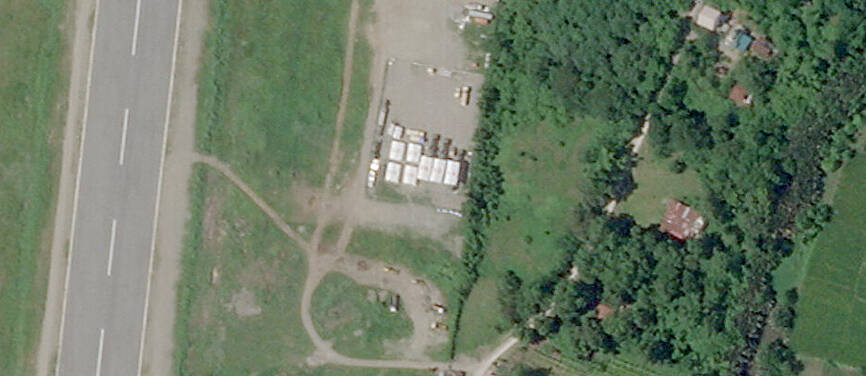The Philippine military yesterday said it plans to acquire the US Typhon missile system to protect its maritime interests, some of which overlap with regional power China.
The US Army deployed the mid-range missile system in the northern Philippines earlier this year for annual joint military exercises with its longtime ally, and left it there despite criticism by Beijing that it was destabilizing to Asia.
Since then, it has been used by Philippine forces to train for its operation.

Photo: Planet Labs Inc via Reuters
“It is planned to be acquired, because we see its feasibility and its functionality in our concept of archipelagic defence implementation,” Philippine Army Commanding General Roy Galido told a news conference.
“I’m happy to report to our fellow countrymen that your army is developing this capability for the interest of protecting our sovereignty,” he said, adding that the total number to be acquired would depend on “economics.”
The presence of the US missile launcher in the northern Philippines had angered Beijing, whose navy and coast guard forces have engaged in escalating confrontations over the past few months with the Philippines over disputed reefs and waters in the South China Sea.
Beijing claims almost the entire South China Sea despite an international ruling that its assertion has no legal basis.
As a rule, it takes at least two or more years for the Philippine military to acquire a new weapons system from the planning stage, Galido said, adding it was not yet budgeted for next year.
It took five years for Manila to take delivery of the BrahMos cruise missile last year, he added.
The land-based “mid-range capability” Typhon missile launcher, developed by US firm Lockheed Martin for the US Army, has a range of 480km, although a longer-range version is in development.
Galido said the Typhon system would enable the army to “project force” outwards up to 200 nautical miles (370km), which is the limit of the archipelago nation’s maritime entitlements under the UN Convention on the Law of the Sea.
“You have to take note of the fact that at 200 nautical miles there is no land there and the army cannot go there,” he said.
“We need to contribute to this [defense of Philippine interests] by having this platform to be able to assist the primary major service that would focus on maritime and air domain,” he added.
Under that scenario, the Typhon platform “will protect our floating assets,” he said, a reference to ships of the Philippine navy, coast guard and other vessel.
Chinese Minister of National Defense Dong Jun (董軍) in June said that the Typhon deployment was “severely damaging regional security and stability.”
Galido dismissed the criticism against the Typhon system in the Philippines.
“We should not be bothered by others’ seeming insecurities, because we don’t have any plans to go outside of our country’s interests,” he said.

‘DANGEROUS GAME’: Legislative Yuan budget cuts have already become a point of discussion for Democrats and Republicans in Washington, Elbridge Colby said Taiwan’s fall to China “would be a disaster for American interests” and Taipei must raise defense spending to deter Beijing, US President Donald Trump’s pick to lead Pentagon policy, Elbridge Colby, said on Tuesday during his US Senate confirmation hearing. The nominee for US undersecretary of defense for policy told the Armed Services Committee that Washington needs to motivate Taiwan to avoid a conflict with China and that he is “profoundly disturbed” about its perceived reluctance to raise defense spending closer to 10 percent of GDP. Colby, a China hawk who also served in the Pentagon in Trump’s first team,

SEPARATE: The MAC rebutted Beijing’s claim that Taiwan is China’s province, asserting that UN Resolution 2758 neither mentions Taiwan nor grants the PRC authority over it The “status quo” of democratic Taiwan and autocratic China not belonging to each other has long been recognized by the international community, the Mainland Affairs Council (MAC) said yesterday in its rebuttal of Beijing’s claim that Taiwan can only be represented in the UN as “Taiwan, Province of China.” Chinese Minister of Foreign Affairs Wang Yi (王毅) yesterday at a news conference of the third session at the 14th National People’s Congress said that Taiwan can only be referred to as “Taiwan, Province of China” at the UN. Taiwan is an inseparable part of Chinese territory, which is not only history but

CROSSED A LINE: While entertainers working in China have made pro-China statements before, this time it seriously affected the nation’s security and interests, a source said The Mainland Affairs Council (MAC) late on Saturday night condemned the comments of Taiwanese entertainers who reposted Chinese statements denigrating Taiwan’s sovereignty. The nation’s cross-strait affairs authority issued the statement after several Taiwanese entertainers, including Patty Hou (侯佩岑), Ouyang Nana (歐陽娜娜) and Michelle Chen (陳妍希), on Friday and Saturday shared on their respective Sina Weibo (微博) accounts a post by state broadcaster China Central Television. The post showed an image of a map of Taiwan along with the five stars of the Chinese flag, and the message: “Taiwan is never a country. It never was and never will be.” The post followed remarks

INVESTMENT WATCH: The US activity would not affect the firm’s investment in Taiwan, where 11 production lines would likely be completed this year, C.C. Wei said Investments by Taiwan Semiconductor Manufacturing Co (TSMC, 台積電) in the US should not be a cause for concern, but rather seen as the moment that the company and Taiwan stepped into the global spotlight, President William Lai (賴清德) told a news conference at the Presidential Office in Taipei yesterday alongside TSMC chairman and chief executive officer C.C. Wei (魏哲家). Wei and US President Donald Trump in Washington on Monday announced plans to invest US$100 billion in the US to build three advanced foundries, two packaging plants, and a research and development center, after Trump threatened to slap tariffs on chips made